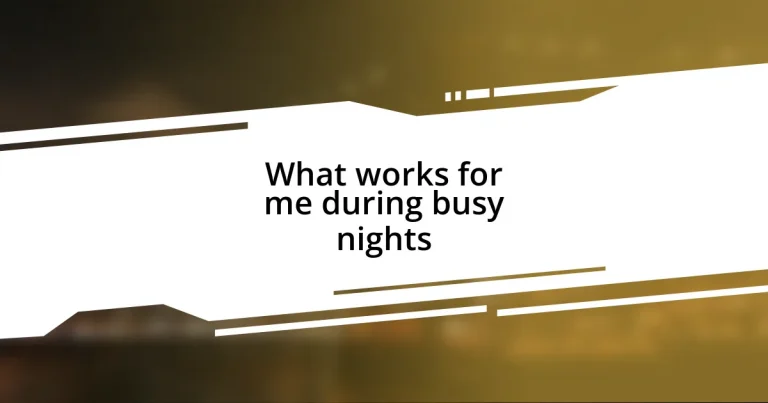Key takeaways:
- Visualizing and scheduling tasks can significantly reduce stress and improve organization for busy nights.
- Implementing time management techniques like the Pomodoro Technique and prioritizing tasks helps maintain focus and productivity.
- Self-care practices, including mindfulness and hydration, are essential to sustaining energy and effectiveness during hectic periods.
- Creating a conducive atmosphere through lighting, decluttering, and background sounds enhances concentration and makes tasks more enjoyable.

Planning for Busy Nights
When I find myself gearing up for a busy night, I like to take a moment to visualize how the evening will unfold. It seems simple, but imagining the tasks ahead, down to the little details, keeps me grounded. Have you ever felt that sense of calm wash over you when everything is mapped out in your mind?
Creating a detailed schedule has become my secret weapon for those hectic evenings. I assign time slots for each task, and honestly? Even the act of writing it down relieves some pressure. It’s like a mini-contract with myself saying, “Hey, I’ve got this, and I know what’s next.”
I also make it a point to prepare some meals in advance. During particularly busy periods, I lean on my freezer for quick dinners. It’s such a relief to grab a homemade meal instead of cringing at the thought of fast food. I still remember the time I discovered a stash of frozen chili; it turned a chaotic night into a cozy dinner – who wouldn’t appreciate that?
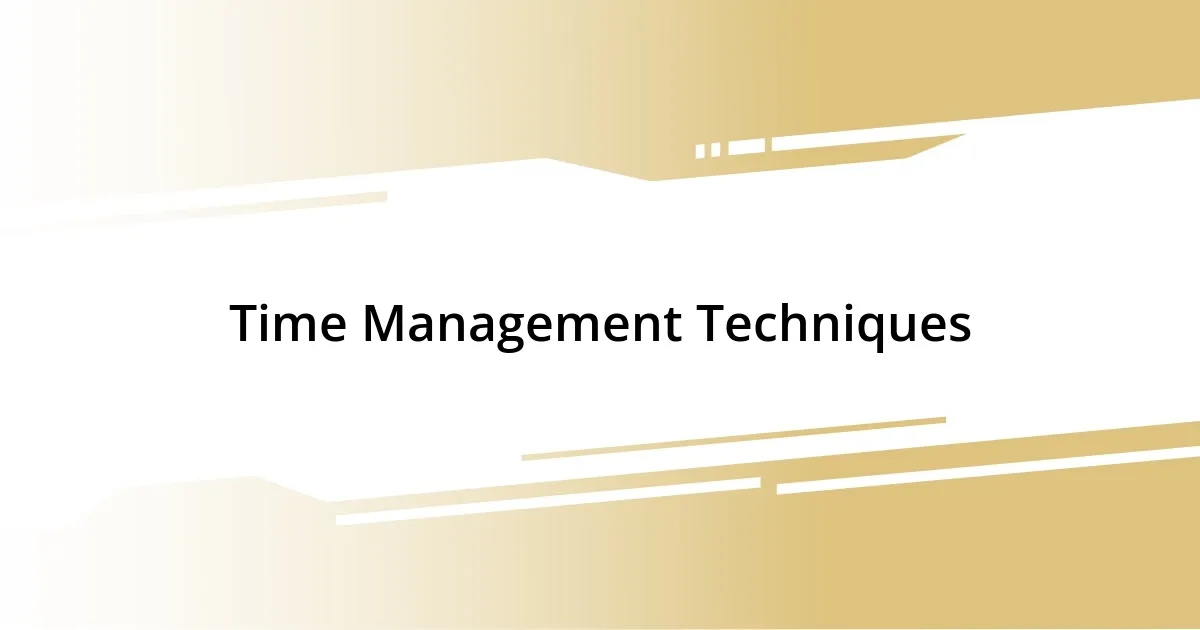
Time Management Techniques
Time management is all about finding techniques that resonate with personal style and routine. One method that has worked wonders for me is the Pomodoro Technique. It’s simple: I work in bursts of focused time, typically 25 minutes, followed by a short break. This approach not only keeps my energy levels steady but often leads to increased productivity. I remember a night when I completed a daunting project using this technique and felt a lot less exhausted than usual.
Here’s a quick list of time management techniques that I find exceptionally helpful during busy nights:
- Prioritize Tasks: I always identify my top three priorities for the night. Knowing what needs urgent attention helps me stay focused.
- Set Time Limits: I allocate specific time frames for each task. Even if I’m not finished, knowing there’s a deadline encourages me to work efficiently.
- Eliminate Distractions: I turn off notifications and create a quiet workspace. It’s amazing how much more I accomplish with minimal interruptions.
- Use Visual Aids: I keep a whiteboard with my tasks. Seeing them laid out helps me stay on track while providing a satisfying sense of progress.
- Reflect on Your Day: At the end of a busy night, I take a moment to review what I achieved. It’s comforting and motivating for planning ahead.
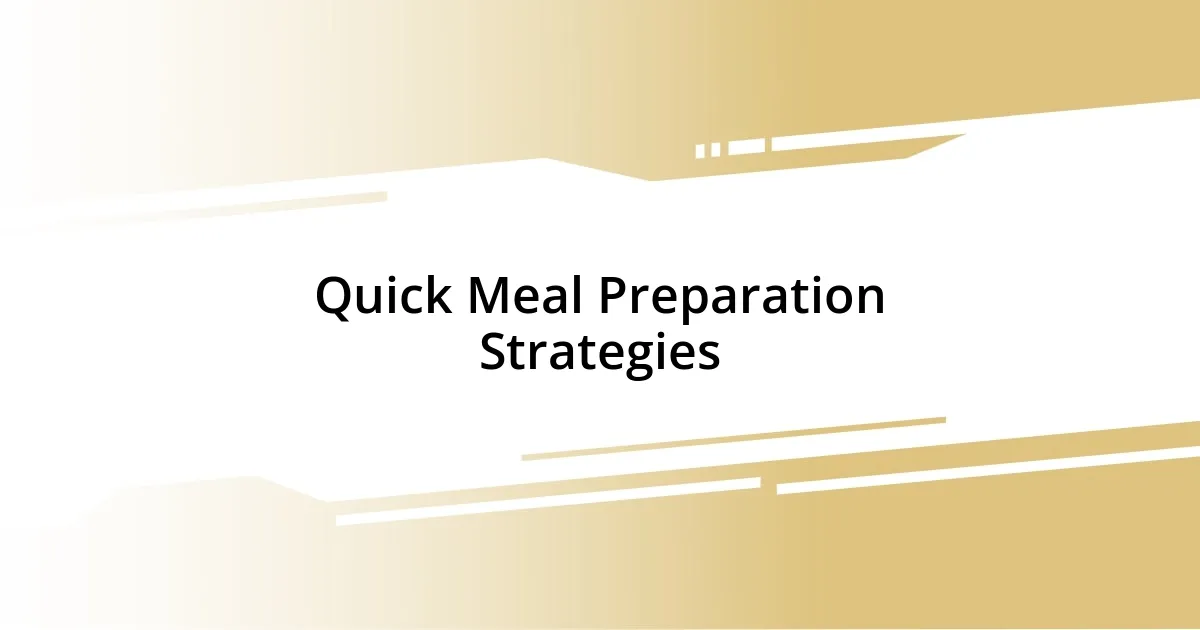
Quick Meal Preparation Strategies
When the clock is ticking and I need to whip up something fast, meal prep becomes my best friend. A great strategy I’ve adopted is batch cooking on quieter days, allowing me to store meals that can be quickly reheated later. I vividly recall a Sunday where I made a huge pot of vegetable soup, which turned into lifesaver dinners throughout the week. Each time I heated a bowl, I felt that comforting mix of warmth and satisfaction.
Another crucial approach is utilizing kitchen gadgets that save time. I sometimes use my Instant Pot or slow cooker; they’re a game-changer when busy nights roll in. Simply toss in some ingredients and let technology do its magic while I tackle other tasks. I remember a night I cooked chicken curry this way. It simmered effortlessly while I managed other responsibilities, filling my home with an irresistible aroma that made everything feel just a little bit less hectic.
Lastly, organizing my pantry can save precious moments during crisis cooking. Keeping ingredients visible and easy to access makes meal assembly quicker. I’ve come to appreciate the nights when I can open my pantry and throw together a hearty stir-fry with whatever I have on hand. That little bit of preparation saves me from the dreaded “what’s for dinner?” panic.
| Strategy | Description |
|---|---|
| Batch Cooking | Preparing meals in advance to store for quick reheating on busy nights. |
| Utilizing Gadgets | Using devices like Instant Pots or slow cookers to reduce active cooking time. |
| Pantry Organization | Keeping ingredients easily accessible to make quick meal assembly possible. |
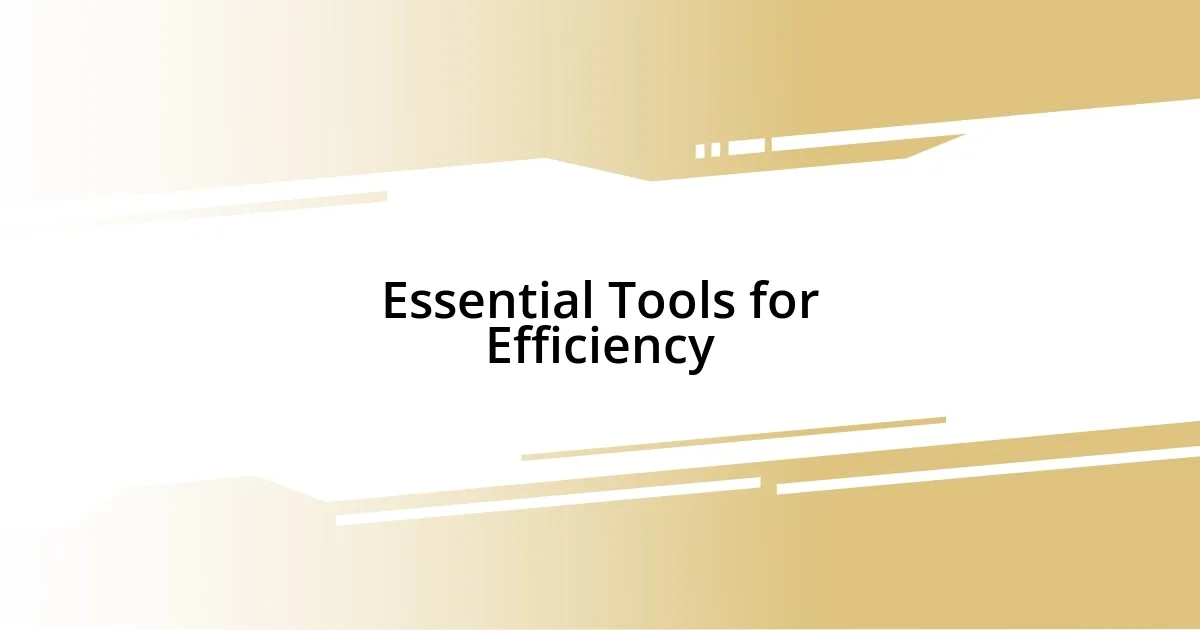
Essential Tools for Efficiency
When it comes to being efficient, I can’t stress enough the value of digital tools. I’ve relied on apps like Trello to organize my tasks visually, breaking my night down into manageable pieces. The thrill of dragging completed tasks off my board feels incredibly rewarding, like I’m physically witnessing my progress, and it motivates me to keep going. Ever had a day where a simple to-do list transformed your chaos into clarity? Trust me; it truly works!
Another tool that has elevated my efficiency is my timer. It seems so basic, but setting a timer for focused work sessions has changed the game for me. It creates a little urgency that drives me forward. I remember one particularly hectic night when I felt overwhelmed — until I set a timer for 20 minutes and just dove in. The ticking clock acted like my personal cheerleader, urging me to make every second count.
Lastly, I’ve found collaboration tools indispensable, especially during busy nights. Whether it’s sharing a Google Doc or using communication platforms like Slack, being able to collaborate in real-time can significantly reduce bottlenecks. I recall a night spent on a team project, where quick messages and instant updates streamlined our efforts, making what seemed like a looming deadline feel manageable and even fun. Isn’t it fascinating how a shared goal can take the pressure off?

Creating a Productive Atmosphere
Creating a productive atmosphere is essential for me during those wild and busy nights. Lighting plays a vital role; I often dim the overhead lights and rely on warm lamps or candles. There’s something about that cozy, inviting glow that eases my racing mind. Have you ever noticed how harsh lighting can make even the simplest tasks feel overwhelming? I have, and that’s why I prioritize creating an environment that promotes calm and focus.
I’ve also realized how critical it is to reduce clutter in my workspace. A tidy area helps me think more clearly and engage better with whatever I’m doing. One evening, I was buried under a pile of papers, and it felt impossible to focus. After taking just a few minutes to organize my space, I was surprised at how much my mood lifted. Suddenly, I could tackle my to-do list with renewed energy. Isn’t it amazing how a little organization can unclutter not just our space but our minds too?
Sound is another factor I can’t ignore when it comes to atmosphere. I often play soft background music or ambient sounds while I work. It creates a rhythm that makes me feel more productive. One time, listening to soothing piano melodies while preparing a presentation made the task feel like a creative endeavor rather than a chore. What about you? Do you have a go-to playlist that brings you into your zone? I find that these little adjustments can transform a chaotic night into a more manageable, enjoyable experience.
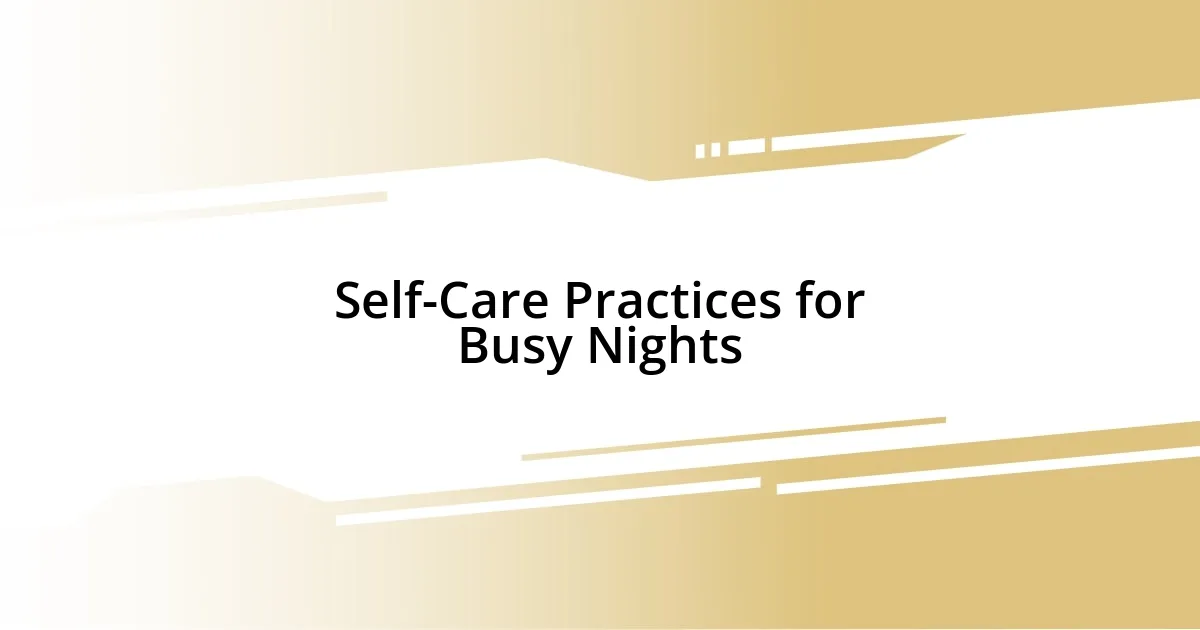
Self-Care Practices for Busy Nights
Taking moments for self-care during busy nights has become a non-negotiable for me. I always carve out just five minutes for a quick mindfulness practice, like deep breathing or a short meditation. It may seem minor, but I can truly feel the cortisol levels drop. Have you ever paused mid-task and felt a wave of calm wash over you? That’s exactly what happens, and those few moments recharge my mental batteries.
Another practice that I can’t recommend enough is the mini-break. After tackling a chunk of work, I step away from my desk to stretch or take a short walk. One night while racing against a deadline, I decided to take a quick stroll around my living room. Surprisingly, just a few minutes away from my screen allowed the creative juices to flow and gave me a new perspective on the challenge at hand. How often do we forget that a little movement can spark clarity?
Hydration is key for me as well. I keep a large water bottle handy, ensuring I sip regularly. On particularly hectic nights, I’ve noticed that when I forget to drink enough water, my focus starts to dwindle, leading to unnecessary brain fog. Isn’t it interesting how something as simple as staying hydrated can keep us sharp? Making self-care a priority during busy times not only makes me feel better but also boosts my productivity and overall well-being.
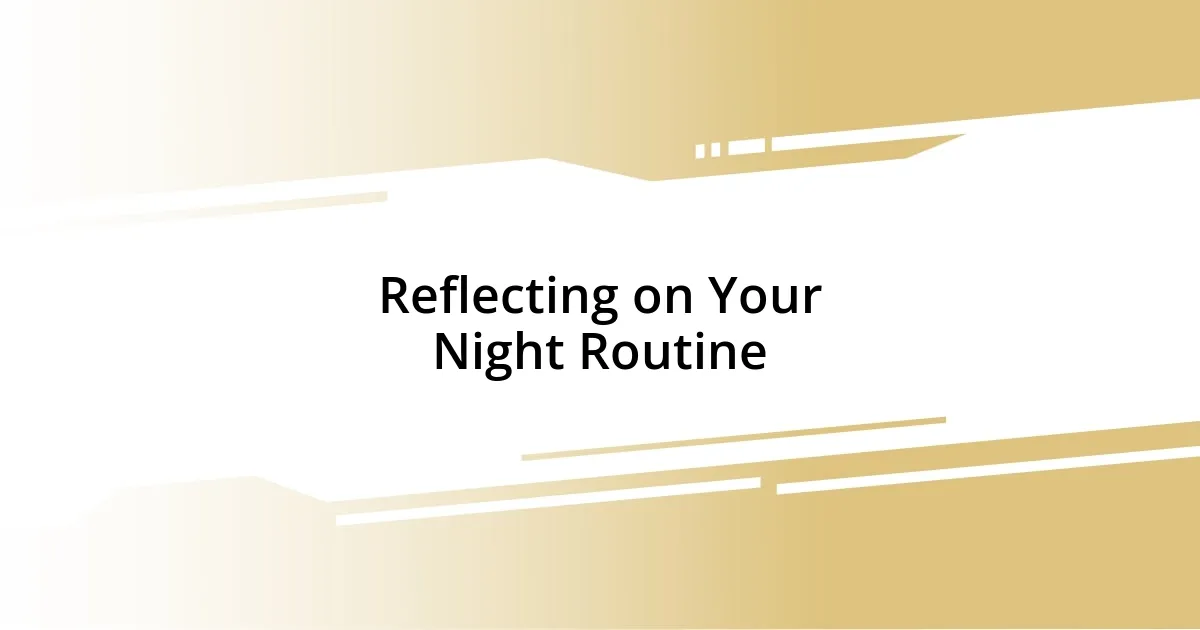
Reflecting on Your Night Routine
Reflecting on my night routine has taught me that small tweaks make a significant difference. For instance, I’ve started winding down with a consistent bedtime ritual, like reading a few pages of a book. It may seem trivial, but that simple act provides a mental shift, signaling my brain that it’s time to rest. Have you ever found it difficult to unwind after a hectic day? I used to struggle with that too, until I embraced this calming nightly practice.
I also take a moment to evaluate my productivity and identify what truly worked for me. On one occasion, after a particularly chaotic night, I realized I’d accomplished a lot by using the Pomodoro Technique. This time management method, where I worked in focused intervals followed by short breaks, kept my efforts efficient. It’s fascinating how reflecting on these practices can teach us more about our rhythm and habits. Isn’t it refreshing to acknowledge our successes, no matter how small?
Finally, I keep a journal where I jot down my thoughts before sleep, which has become a cherished part of my routine. One night, pouring out my worries and to-do lists onto the page lightened my mental load and made falling asleep much easier. Have you ever tried writing your thoughts down to declutter your mind? I can’t recommend it enough; it’s remarkable what a little self-reflection can accomplish in paving the way for a more peaceful night.












